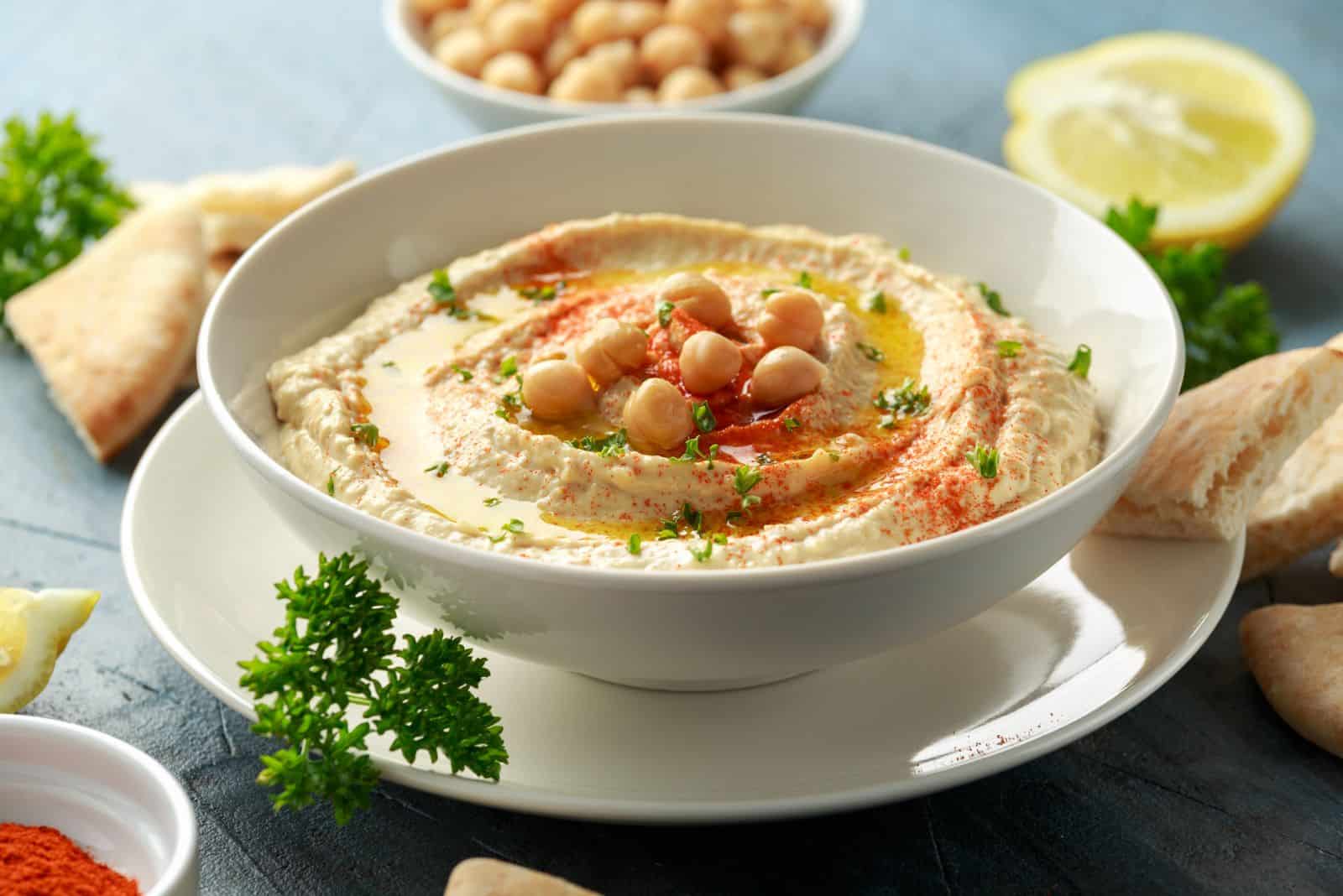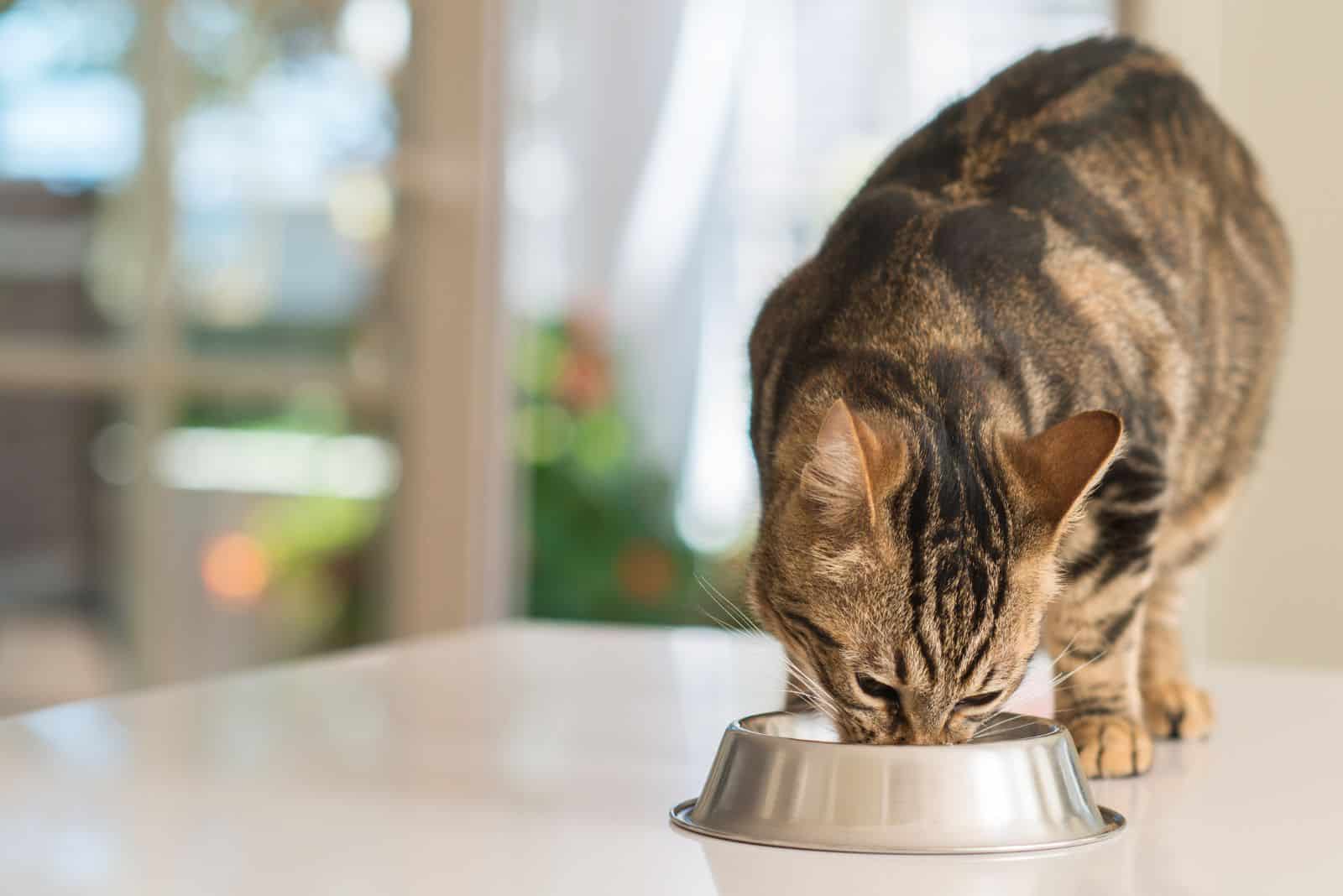Should we give human food to our cats? No, not really. Do we all do it, at least sometimes? Well, probably yes. Who could resist those cute little eyes looking at us and just begging us to share a bit of our tasty meal with them?
Of course, I don’t recommend you share your meals with your kitten, especially not regularly. But, this also depends a lot on the type of food you consider giving to your pet. Perhaps you’re considering giving a bit of your hummus to your cat.
Can cats eat hummus? What ingredients does this food contain, and can it be dangerous for cats?
Is it a better idea to completely avoid giving this creamy dip to your kitten? Yes, you should definitely do this. Cats really shouldn’t eat hummus.
Let’s take a deeper look at the issue.
Why Is Hummus Bad For Cats?

Hummus is a dish that is traditionally made from olive oil, tahini, ground chickpeas, lemon juice, and spices.
This food is very rich in nutrients and provides people with many vitamins and minerals – significantly more than any other sauce or spread.
Hummus also contains magnesium, folic acid, and calcium, and has a positive effect on stabilizing blood sugar and even preventing heart disease in humans.
It really does sound like a miracle food, doesn't it? Yes, hummus is very useful for humans, but this isn’t the case with cats, since its ingredients can be dangerous for a cat’s health.
1. Calories
Although hummus is known as a healthy food, it still contains a lot of calories due to the tahini and oil in its composition.
So it's not good even for people to overeat the hummus, and imagine just tiny cats that usually don't weigh more than 10 pounds!
This can lead to obesity problems in cats. According to Meredith Wall and her associates [1], anywhere from 11.5 to 63% of pet cats are overweight worldwide.
As a responsible pet owner, you should do everything in your power to avoid this scenario. Depriving your cat of foods like hummus is definitely a smart thing to do.
2. Spices
Spices and seasoning are in general not a good idea for felines.
Hummus has a lot of these – especially salt and garlic. Eating salty food can make your cat dehydrated, causing her to drink a lot of water and meow excessively.
Bloorcourt Veterinary Clinic explains how garlic is something that definitely shouldn’t be a part of your cat’s diet.
Garlic, as well as the onion and chive, are a part of the Allium family and are a kind of vegetable that can be toxic for felines.
So, if your cat eats food containing garlic – such as hummus – this can cause abdominal pain, diarrhea, and vomiting in her.
If a cat eats a lot of food containing garlic, this can even lead to oxidative damage to her red blood cells.
3. Olive Oil

Olive oil is a desirable kind of oil in humans’ diet. But, once again, a cat's digestive system is quite different from ours; Something that’s good for us can be very bad for our furry friends.
According to Hill’s Pet, olive oil isn’t poisonous to cats. This means that you don’t need to panic if your kitten has licked some of your food that has this oil in it.
However, olive oil is high in monounsaturated fatty acids, meaning that it can cause weight gain in felines. Also, eating food containing this oil can make your cat develop stomach pain, diarrhea, and vomiting.
Therefore, it’s better to avoid giving it to your cat.
4. Lemon Juice
Even if your cat has a bit of lemon juice, this can cause gastrointestinal problems for her, as well as weakness, and even low blood pressure.
If a cat ingests a large amount of lemon juice, this can lead to poisoning and organ failure.
So, lemon is definitely a big no for your cat. Luckily, cats hate the citrus smell, so, many of them will avoid licking food smelling like this fruit.
They actually dislike this smell so much that you can use lemon as an essential oil to keep your cat off the counters!
5. Chickpeas
There’s actually nothing wrong with your cat eating chickpeas. This legume is high in protein and isn’t considered poisonous to felines.
Still, this food should be given to cats only occasionally, and not a part of their regular diet. If your cat eats too many chickpeas, this can also cause digestive upset in her.
Balance is one of the most important things in your cat’s nutrition. If your cat really likes chickpeas, and you’re unsure about what amount of this food is safe to give her, you should consult your veterinarian.
Can Hummus Kill Your Cat?

Chances are hummus isn’t likely to kill your cat. She would need to eat a lot of it to put her in a life-threatening situation.
Still, as we could have seen, you really shouldn’t share your hummus with your cat. The risk of her getting obese or poisoned should be enough for you not to even think about giving her a bit of this human food.
If you would still like to see your cat’s happy face and give her some tasty treats from time to time, petMd suggests human food such as turkey, chicken, tuna, salmon, and lamb.
Of course, you should always monitor how your cat responds to any new food in her diet. If you notice any signs of an allergic reaction, or upset stomach in her, contact your vet immediately.
Final Words
Can cats eat hummus? They really shouldn’t, since this healthy food option for humans contains ingredients such as salt, garlic, and lemon juice, which can be very bad for your cat’s health.
This doesn’t mean you should panic if your kitten has licked a bit of your hummus. But, it means you should be careful, and you shouldn’t give hummus to your cat.
If she likes the taste of hummus, you can perhaps consult your veterinarian on making your own, homemade version based on chickpeas. This way you’ll be sure there aren’t any harmful ingredients for your cat in it.
But, even a healthy version of hummus should only be given to cats occasionally. Remember that felines are obligate carnivores, meaning that they thrive on a meat-based diet.
References:
[1] Wall M, Cave NJ, Vallee E. Owner and Cat-Related Risk Factors for Feline Overweight or Obesity. Front Vet Sci. 2019 Aug 19;6:266. DOI, Retrieved June 02, 2023.
Read Next: 9 Best Tasting Cat Foods for Picky Eaters





